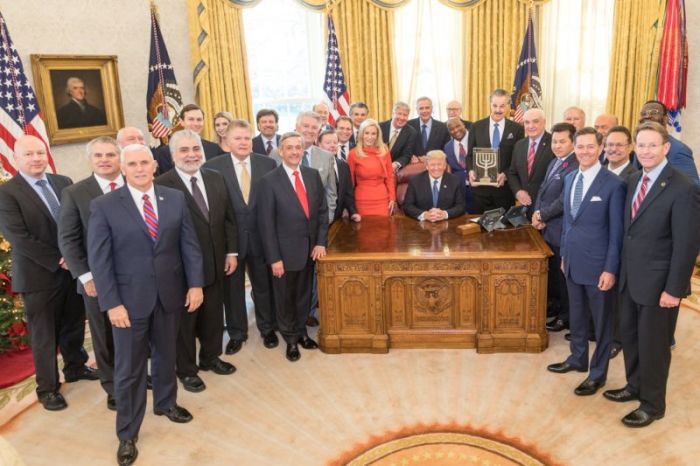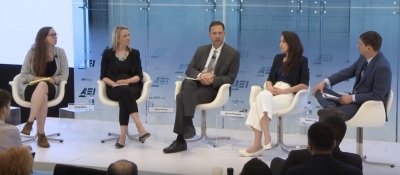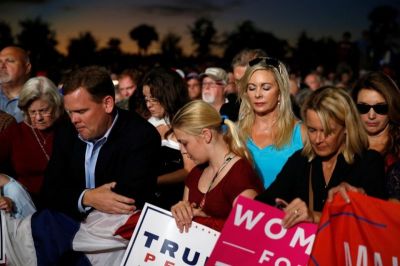Trump's white evangelical support softer than you think, report says

White evangelical support for President Donald Trump may not be as strong as presumed, according to experts on religion and politics in the United States at a panel event hosted by a conservative think tank.
The Washington, D.C.-based American Enterprise Institute hosted a panel event on Wednesday morning titled “The Christian right in the Trump and post-Trump eras.”
Joanna Piacenza, features editor for Morning Consult, reviewed new research conducted on the views of white evangelicals and other religious groups about President Trump.
The Morning Consult survey, posted Wednesday, found that white evangelicals were less likely than Republicans in general to want Trump to be the presidential nominee in 2020.
Fifty-five percent of white evangelical respondents wanted Trump to be at the top of the 2020 presidential ticket, with 20 percent responding that they don’t know or hold no opinion, 18 percent saying Vice President Mike Pence, and 8 percent wanting another Republican.

By contrast, 71 percent of Republican respondents wanted Trump at the top of the ticket, followed by 13 percent wanting Vice President Pence, 10 percent saying they don’t know or have no opinion, and 5 percent saying another Republican.
This meant that among overall Republicans, there was a 16 percent higher rate of support for Trump running in 2020 than among white evangelicals.
“It’s important to note, however, that in 2016, white evangelicals voted for Trump at an 8 to 2 margin,” noted Piacenza during the panel event.
“So that 20 percent is about in line as what we saw two, three years ago during the election. It also means that 20 percent is up for grabs, that 8 percent could be up for grabs.”
Piacenza pointed out that the 55 percent support for Trump from white evangelicals was higher than white mainline Protestants (41 percent), white Catholics (42 percent), and religiously unaffiliated (24 percent).
Piacenza believed evangelicals were less likely than other religious groups to not support Trump due to factors like evangelicals feeling that they are “losing power and influence” and “being discriminated against.”
Released Wednesday, the Morning Consult data was taken from a survey conducted April 23-24 among 2,201 adults. From that sample space was drawn 681 respondents identifying as Republican and 368 identifying as white evangelical Protestant, with their respective margin of errors being plus or minus 4 percentage points and plus or minus 5 percentage points.
David Barker, professor of government and director of the Center for Congressional and Presidential Studies at American University, told those gathered at the panel event about how evangelical support for Trump often varied on the basis of religious involvement.
Barker presented research from the Democracy Fund’s 2018 Voter Study Group Data, which measured Trump favorability among GOP voters by different groups on a scale of 0 to 1, with 1 being the most supportive of Trump while 0 was the least supportive.

Barker split evangelicals into two categories. “Inactive Evangelical Christians,” who subscribe to evangelical beliefs but rarely attend church, and “Active Evangelical Christians,” those who subscribe to evangelical beliefs and are involved in church.
The research found that while “Inactive Evangelical Christians” had a 0.81 favorability for Trump, “Active Evangelical Christians” had a 0.74 favorability for Trump, which was the same as the “Seculars” category (0.74) but slightly higher than the “overall mean” (0.71).
“Being religious actually leads you to support Trump less among this group,” Barker said. “The highest level of support we see among religious people are people who identify as born-again Christians but aren’t actually doing anything about that most of the time.”
In addition to Piacenza and Barker, other panelists included Emily Ekins, research fellow and director of polling at the libertarian think tank the Cato Institute and Emma Green, staff writer at The Atlantic who specializes in politics, policy, and religion.
Daniel A. Cox, research fellow at AEI who formerly served as research director at the Public Religion Research Institute, moderated the panel discussion.
During his introductory remarks, Cox noted that the “relationship between Trump and the conservative Christian movement defies easy explanation.”
“From the earliest days of Trump’s campaign, an open question was how would Trump, a thrice-married admitted adulterer, fare among social conservatives? Well, he’s actually fared fairly well,” stated Cox.
“Even amidst the relentless series of scandals and controversies plaguing the Trump administration, Evangelical support has been a consistent bright spot. It’s the reason that a primary challenge against Trump would probably fail if it ever even materializes and why he would remain a viable contender for 2020.”
The panel entertained multiple factors, such as a sense by evangelicals that they are singled out for persecution by mainstream culture and a concern by evangelicals over the sweeping changes in the culture, especially on issues like gay marriage and gender identity.
When analyzing factors, Ekins of Cato said that Trump, like former President Ronald Reagan, was able to make evangelicals feel he was “looking out for” them.
“It’s not necessarily about which political leader best embodies your particular set of values. Its which party is looking out for you,” explained Ekins.
“I think that Trump communicated that to them. Ronald Reagan was also personally not the most religious person … but he spoke to religious people and said ‘you have moral authority. Your beliefs matter and I’m going to defend that in the arena of politics.’ And I think Trump did something similar.”
In March, a Pew Research Center analysis found that white evangelical support had fallen 9 percentage points between February 2017 and February 2019, going from 78 percent to 69 percent.
The 9 point decline represented the largest decrease in support of any religious groups surveyed by Pew for their report, with the second largest being among white Catholics, who went from 52 percent in 2017 to 44 percent in 2019.
“An August 2018 survey found that roughly half of white evangelicals do not think that Trump has set a high moral standard for the presidency since taking office,” explained Pew in their March report.
“Some prominent evangelical leaders, such as Rick Warren, pastor of Saddleback Church, have expressed ambivalence about Trump and concern about some of his policies. Others, such as Beth Moore, founder of Living Proof Ministries, openly oppose the president.”




























